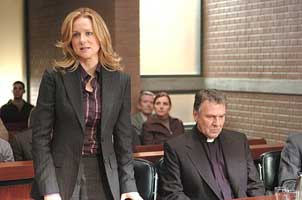

|
Emily Rose
6 out of 10 |
 |
|
Do Demons Exist, Your Honour? The Police find a girl has died in the presence of a priest.after being called to a litle house on the prairies. She did not take perscribed psychiatric drugs after consulting with the priest who is then charged with manslaughter.Is he guilty of negligence or the sole person who stood against a tide of evil? With the trial and the circumstance surrounding it forming the core of the movie, the events that preceded her death are lived out in flashbacks, allowing director Scott Derrickson to "cut to the chase" and fill the screen with an array of action sequences and disturbing images so disturbing that even my girlfriend has no desire to discuss the picture again. Rather than preach the existance of demons, (always a boon for any such flick), to its credit, the movie does not preach either side of the case, but instead, the Jury are a plot device, an on-screen stand-in for the audience who must decide regarding the existence of demons. Interestingly enough, the Priest's lawyer is Erin Bruner (Laura Linney), a sceptic forced to question her lack of belief and who finds herself against a prosecutor who is a committed Chrisitan, Ethan Thomas (Campbell Scott), but does not believe in demons. At an early point, embattled Father Moore warns his attorney that "there are dark forces surrounding this trial." With a budget of just a triffling $20,000,000 (barely enough to pay for Al Pacino's hairstylist in any other film) it was clear from the first frame that the "dark forces" are none other than that of the studio's finance department. Hiring Kentucky hick to run about in the bucketing rain like a cowgirl who has left the corral gate open, and veteran Yorkshireman Tom Wilkinson as the embattled priest, more used to minor supporting roles such as Falcone the mobster in "Batman Begins", it is not hard to guess that cost was paramount in the minds of the makers. With almost the only sets being a creepy apartment, an old farmhouse and barn and a tacky courtroom, this flick might be a Catholic's nightmare, but it's also an accountant's dream. So is Emily Rose a psychopath, faking it to get some cheap attention or someone possessed? For the first couple of decades of my life, I survived living with a true sociopathic psychopath.Whereas Emily Rose's behaviour is clearly that of a psychopath faking possession, it does leave the question of whether "psychopath" is merely an organised and contageous evil where a part of a person that is rotten and corrupt can excludes that which it good. Despite being a low budget flick, the trial does open the whole question of evil and is there such a thing as "possession"? What is the nature of evil? At the Nuremberg War Trials, prison psychologist Gustav Gilbert conclued it was, "A genuine incapacity to feel with their fellow man. Evil, I think, is the absence of empathy." Basing a trial upon a Bible truth is clearly laughably discredited with the the Inquisition, burning of witches and other haenous Church activites showing not a jot of empathy whatsoever for their victims, but are the activities of modern day psychiatry any better? They walk amongst us with all the power of the Medieval clergy, claiming that to disagree with them is itself a sign of a disorder, yet is it any more scientific than "The Bible Truth"? Science proves by using logical deductive and inductive thinking, yet psychiatry uses empirical data, by identifying "patterns", tagging it a "disorder" and stating this to be a fact determined by an "expert" whose word is better than that of the rest of us mere mortals. Are these really illnesses or different typesof of people? Is the study of "psychopath" the rediscovery of "possession"? With all its sickening images of
Emily ripping her nails out by clawing at the walls, yet a distinct
lack of foul language and gross out effects, not only does it is like
an upgrade of "The Exocist", but is more accessible with only
a PG13 classification. Based on a true case, it hits with a punch. For
Laura Linney. it was a breaththrough movie at long last for this old
trooper. For Emily Rose, real life meant death and the prosecution of
her priest. Why? Precisely because he DID repect her decision to refuse
the drugs psychiatrists denanded and did not force them down her throat...in
short, he had an empathy for her, so lacking by her psychiatrists.
Film Critic: Robert L Thompsett
|
|